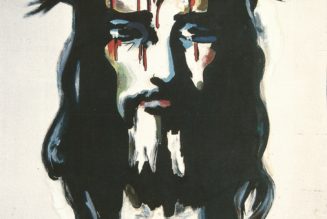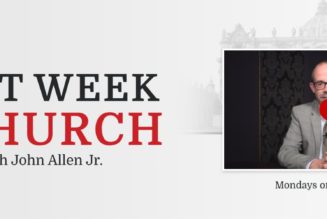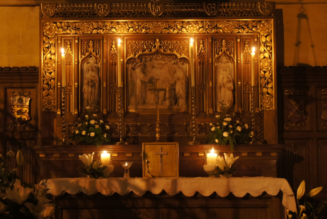, May 13, 2021
Oops. We thought Lent and Easter were the end of salvation history. Boy, were we wrong.
This Sunday — Ascension Sunday or Seventh Sunday of Easter, depending on where you live — teaches us that God sees Lent and Easter in a totally different way from the way most of us do.
We want to think of ourselves as “saved” — but Jesus wants us to think of ourselves as “sent.”
It’s there in the Gospel no matter which day your diocese celebrates.
At the Ascension, Jesus gives us one job: “Go into the whole world and proclaim the gospel to every creature. Whoever believes and is baptized will be saved; whoever does not will be condemned.”
So, yes, Baptism definitely saves us, but it also sends us to the ”whole world” and ”every creature.” Imagine what this means in our favorite Gospel stories. Jesus is like a shepherd who leaves the 99 behind to find the one lost sheep. Once he saves it, what would he do next? He would send that sheep back out to help him find other lost sheep, just like the Woman at the Well did.
We love the comforting story of the Prodigal Son, who squanders his inheritance but is welcomed home anyway. But what would come next? The Father would send him back out to find more prodigals, like Jesus did with the Gerasene demoniac.
The Gospel for the Seventh Sunday of Easter says it in even more extraordinary terms. Jesus prays to the Father: “As you sent me into the world, so I sent them into the world.”
That’s huge. Together, the Great Commission and the Last Supper Discourse rewrite the famous verses from John summing up the Good News. Now, not only did God give his Son to the world, he also gave us: For God so loved the world that he sent us, that whoever believes in Jesus Christ should not perish but have eternal life.
This new task means that the world needs our witness, not just our wits.
It’s instructive to compare the First Readings of the two possible Sundays this weekend to see what exactly God expects from us as he sends us.
The First Reading for the Seventh Sunday of Easter explains what the Church did in between the Ascension but before the coming of the Holy Spirit. Judas, the betrayer has left their company and so Peter, the head of the apostles, stands up, and says “My brothers, the Scripture had to be fulfilled which the Holy Spirit spoke.” He interprets the Psalms to say that they must find someone to take the place of Judas. They apostles cast lots and find a successor, Matthias.
Clearly, this is something the Church has learned from and done ever since — but we don’t do it that way anymore.
Before Pentecost, the Holy Spirit was present to the Church in the Scriptures; after Pentecost, the Holy Spirit is present in the Scriptures but also in the living tradition of the Church. We used to have to figure him out; now we have to live him out. Before Pentecost, it was important to restore the original Twelve; after Pentecost the number of successors to the Apostles becomes practically unlimited.
The First Reading for Ascension Sunday, also from Acts, explains what changed: “You will receive power when the Holy Spirit comes upon you, and you will be my witnesses in Jerusalem, throughout Judea and Samaria, and to the ends of the earth.”
Before the Holy Spirit we know him by our wits; afterward, we know him by our witness.
The Holy Spirit to come will make us more than the People of God; it will make us the Mystical Body of Christ.
Luke wrote the Gospel that tells us most about the life of Mary, and he wrote the Acts of the Apostles, which tell us most about the life of the Church. Notice the similarities between what Jesus tells the Church at the Ascension and what Gabriel tells Mary at the Annunciation.
Mary learns that the “power of the Most High” would overshadow her, and “the Holy Spirit will come upon you,” and that “the child to be born will be called holy” and “of his kingdom there will be no end.”
The Church that we will “receive power,” that the Holy Spirit will come upon us and that we will bring his Gospel “to the ends of the earth.” It is clear what is happening: A new Annunciation; we are to be Christ in the world.
In the Second Reading for the Ascension, the Letter to the Ephesians spells this out, calling Jesus “the head over all things to the church, which is his body.” We are not just a club of people who love Jesus; we are reconstituted into Jesus himself. The poetic Gospels we have heard at the end of Easter become literal: Jesus is the vine, we are the branches; God is love and we are to love with his love.
The Second Reading for the Seventh Sunday of Easter emphasizes it again: “No one has ever seen God. Yet, if we love one another, God remains in us, and his love is brought to perfection in us. … God is love, and whoever remains in love remains in God and God in him.”
God’s love is visible through our acts of love; he has no hands or feet or voice in the world but ours.
Jesus shows just how true this is when he says: “These signs will accompany those who believe: in my name they will drive out demons, they will speak new languages. They will pick up serpents with their hands, and if they drink any deadly thing, it will not harm them. They will lay hands on the sick, and they will recover.”
He doesn’t mean each of us individually will do these things, but that all of us, as the mystical body of Christ, will do these things — and we have: you can see these specific signs it in the lives of the saints, ongoing to this day, and you can see them spiritually in each of our lives as the sacraments defeat Satan, neutralize the poison of sin and make us whole.
So, if we thought that Lent and Easter were the beautiful end of Salvation history, we are wrong.
Lent and Easter come so early in the Liturgical Year for a reason. They aren’t the end, they are the beginning. They didn’t complete the job of the salvation of the world, they began it.
It can only be completed by us.
Tags: Ascension Sunday Year B, prayer, Seventh Sunday of Easter Year B, Sunday Gospel, Sunday Readings
Never miss a post! Subscribe below to our weekly newsletter.
Related
Join Our Telegram Group : Salvation & Prosperity









